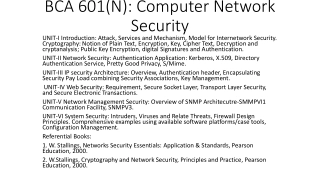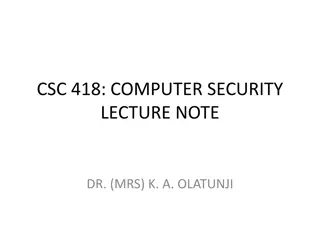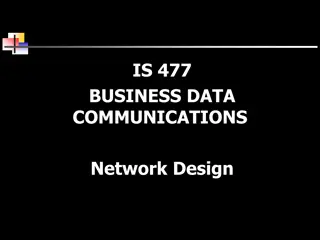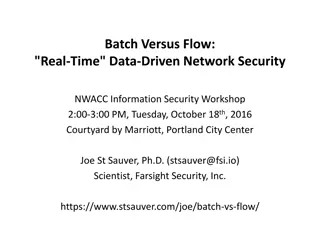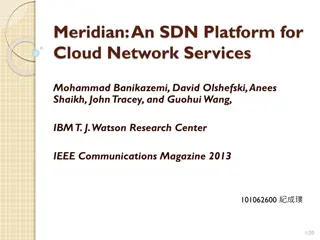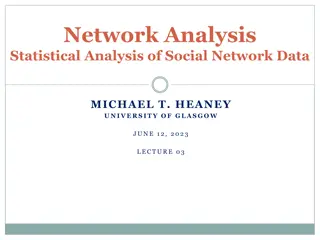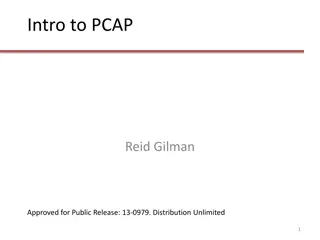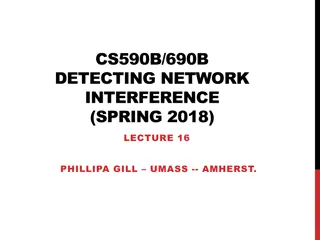Network Security Fundamentals and Today's Security Challenges
Explore the basics of network security fundamentals and the current challenges in today's cyber landscape. Learn about security attacks, difficulties in defense, information security, key terminologies, cyberterrorism, attacker types, attack steps, and defense strategies. Understand the importance of securing digital information to mitigate risks and protect assets against potential threats.
Download Presentation

Please find below an Image/Link to download the presentation.
The content on the website is provided AS IS for your information and personal use only. It may not be sold, licensed, or shared on other websites without obtaining consent from the author.If you encounter any issues during the download, it is possible that the publisher has removed the file from their server.
You are allowed to download the files provided on this website for personal or commercial use, subject to the condition that they are used lawfully. All files are the property of their respective owners.
The content on the website is provided AS IS for your information and personal use only. It may not be sold, licensed, or shared on other websites without obtaining consent from the author.
E N D
Presentation Transcript
Network Security Fundamentals Carrie Estes Collin Donaldson
Todays Security Attacks Half of all malware delivered by web advertising is caused by fake antiviruses. Four computers with weak passwords 24 days 39 sec, 2244/day, 270,000 total Emails from a Prince in Nigeria. 5 years 67 known victims More than $1.3
Fortune 500 Companies Defcon Hacking Conference contest 135 employees called, 17 companies No passwords or SSN s Wanted operating systems, antivirus, and browser Persuaded to visit fraudulent website. 5 did not provide any information
Difficulties in Defending Against Attacks Universally connected devices Increased speed of attacks Greater sophistication of attacks Faster detection of vulnerabilities Delays in patching
What is Information Security? Security A direct action that is intended to inflict damage or suffering An indirect and non-intentional action. Information Security Securing information Digital format Provides value
Terminology Threat A type of action that has the potential to cause harm. Vulnerability A flaw or weakness that allows a threat agent to bypass security Asset An item that has value. Risk Risk = Threat x Vulnerability x Cost
Cyberterrorism A premeditated and politically motivated attack. These attacks are used to cause panic, provoke violence, and possibly result in financial catastrophe. Normally one step behind.
Who are the attackers? Hackers Script Kiddies Spies Insiders
Attacks Steps of an attack 1. Probe for information 2. Penetrate any defenses 3. Modify security settings 4. Circulate to other systems 5. Paralyze networks and devices
Defenses Layering Crown jewels of England Limiting Crown jewels of England handlers Diversity Same as layering, but various types Obscurity Never have shift change at same time Simplicity Complex may be hard to understand
Attacks using malware Malware is software that enters the computer without the users knowledge and performs unwanted and normally harmful actions. Two types Viruses Malicious code that reproduces itself on the computer Worms Malicious program that takes advantage of a vulnerability
Malware that conceals Trojans .exe advertised as one thing, but does another Rootkits Set of software tools used by the attacker to hide actions or the presence of other software Logic bombs Lays dormant until specific logical event triggers it Backdoors Circumvents normal security procedures
Malware that profits Botnets An infected bot (zombie) on a computer and thousands of computers used by the attacker at once. Spyware Software that spies Adware Delivers advertising that is unwanted and unexpected by the user Keyloggers Captures and stores keystrokes on the computer
Phishing Pharming Automatically directs user to fake website Spear Phishing Targets specific users and customized Whaling small fish big fish Vishing Voice phishing
Hoaxes A false warning often contained in an email message claiming to be from an IT department. Says there is a bad virus, you need to change your settings. Changing your settings could allow the attacker to compromise the system or make the computer unstable.
Physical Procedures Dumpster Diving Dr. Oblitey s example (first commonwealth) Tailgating Doors with special keys and people following in
Questions? Comments, concerns, wants for the next meeting?


